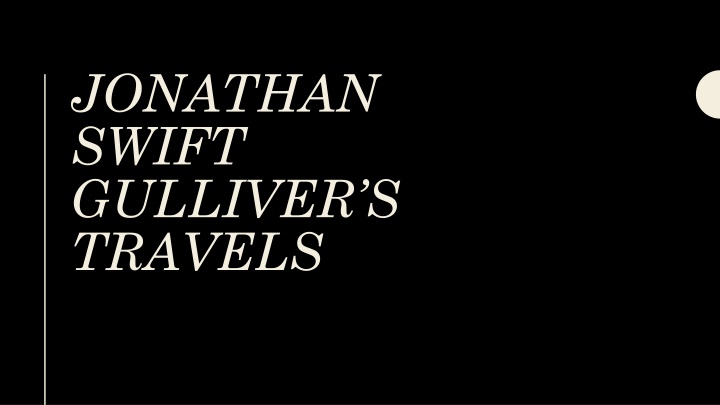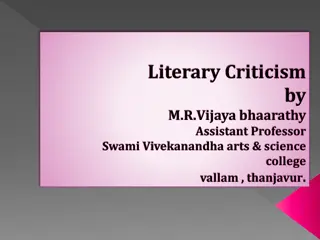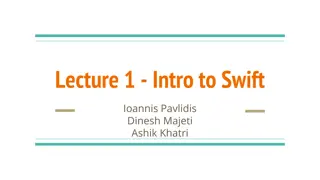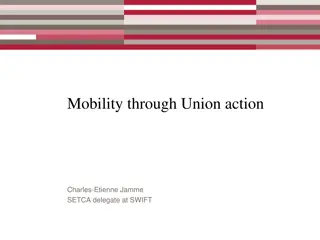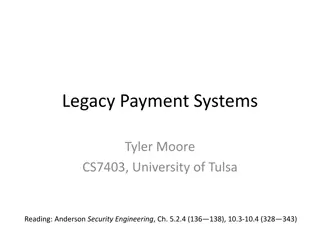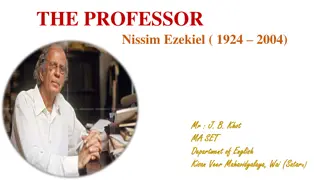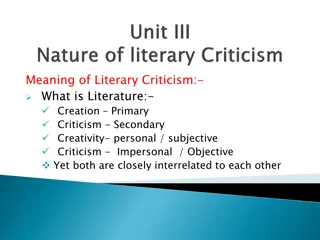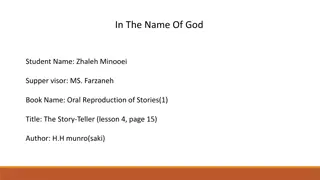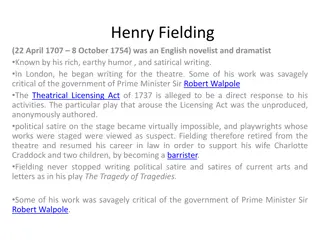Jonathan Swift: A Satirical Genius and Literary Figure
Jonathan Swift, the author of the classic "Gulliver's Travels," was a major figure in English literature known for his satirical works. Born in Dublin in 1667, Swift overcame personal challenges to become a prominent writer and political commentator. His masterpiece, "Gulliver's Travels," remains a celebrated work that reflects Swift's wit and insight into society. Despite facing personal tragedies and health issues, Swift's legacy as a writer and satirist endures.
Download Presentation

Please find below an Image/Link to download the presentation.
The content on the website is provided AS IS for your information and personal use only. It may not be sold, licensed, or shared on other websites without obtaining consent from the author.If you encounter any issues during the download, it is possible that the publisher has removed the file from their server.
You are allowed to download the files provided on this website for personal or commercial use, subject to the condition that they are used lawfully. All files are the property of their respective owners.
The content on the website is provided AS IS for your information and personal use only. It may not be sold, licensed, or shared on other websites without obtaining consent from the author.
E N D
Presentation Transcript
JONATHAN SWIFT GULLIVER S TRAVELS
The author of the classic Gullivers Travels (1726), Jonathan Swift was a major figure of English literature. Also a satirist, cleric and political pamphleteer, Swift was born in Dublin, Ireland on November 30, 1667, seven months after the death of his father. Deprived of a bread earner and father, the family became very poor and had to rely on the aid of relatives to survive. Jonathan did not lead a healthy childhood, suffering from Meniere s disease which causes dizziness, vertigo, nausea, and hearing loss affecting the inner ear. Early inage, Jonathanwas sent tolive with his uncle, Godwin Swift who supported him and gave him the best education possible.
Swift attended the Kilkenny Grammar School from 1674 to 1682 and later enrolled in the Trinity College in Dublin where he earned a B.A. degree. Although Swift wanted to continue studying for a M.A. degree, he was unable to do so due to political unrest during the Glorious Revolution of 1688. Upon moving to Leicester, England, Swift took up a job working as a secretary to Sir William Temple, a retired diplomat. Living at his home in Moore Park, Surrey, Swift was introduced to a number of politically influential people. Also at Moore Park, Swift, then 22 years of age met Stella, daughter of another employee at Moore Park who was only 6 years old. They formed an affectionate friendly relationship and Swift became her tutor and mentor. Sir William Temple helped Swift gain admission into Oxford University using his influential connections. In 1692,Swiftgraduated with aM.A.degree.
After returning from Ireland where he served as an Anglican priest for a year, Swift was requested by Temple to assist him in writing his memoirs, managing and publishing his work after his death. Swift started work on his own writing during this time as well and wrote The Battleofthe Books (1704). In 1700, Swift was appointed Chaplin to Lord Berkeley andin1701TrinityCollege Dublinmade himaDoctorof Divinity. In 1704, Swift published his humorous take on religion,ATaleoftheTub.Swiftbecameanactivefigure of the Dublin society and politics becoming a blunt( rude) critic in efforts of improving Ireland. After joining the Tories in 1710, Swift wrote many noted political pamphlets including The Conduct of the Allies (1711), The Public Spirit of the Whigs (1714), Meditation on a Broomstick(1703)andA ModestProposal.
In 1713, Swift formed the literary club, Scriblerus along with Alexander Pope and others. He also became the dean of St. Patrick s in Dublin. Swift continued writing, often under a pseudonym, an example being Draiper Letters (1724) under the name M.B. Draiper. Swift also published his masterpiece, Gulliver s Travels under the pen name Lemuel Gulliver in 1726. An immediate best- seller, the book has inspired many theater and film adaptations.Thenovelrepresents theculmination(high peak) of Swift s years spent in politics with Whigs and Tories and also deals with socio-political issues hidden between the lines. Swift drowned in grief when his beloved Stella died in 1728. Swift s health had already started to decline due to Alzhimer s. Jonathan Swift passed away on October 19, 1745. He is buried beside Stella in St. Patrick s CathedralinDublin.
Jonathan Swift wrote perceptively about the emerging commercial society in Britain in the early eighteenth century. His particular focus was on the financial revolution and its implications for economic and political stability as well as for shifts of power between the landedand commercialclasses. Following his return to Ireland Swift s focus shifted to the developmental problems of his native country. In the period between 1660 and 1760, Britain transformed itself from a small island economy with a relatively small population into a major naval power with an immense empire. This transformation was driven in part by the powerful forces of commercial capitalism
These changes involved the creation of new forms of virtual property and a shift in authority. Defoe, had his own colorful life had included periods as a merchant, a bankrupt, a manufacturer, a prominent dissenter, a journalist, a spy and propagandist. Defoe was also a vigorous spokesman for the rising trading class and the celebrated author of Robinson Crusoe which many regard as the first English novel. In Crusoe, Defoe depicted a new type of Englishman, empirical, self-reliant, and energetic and with a direct relationship with God. He also broke with the accepted canons of prose style a sacrifice which enabled him to achieve realism and immediacy, both of which became characteristic of the novel.
Defoe exemplifies the positive literary response to the growing importance of trade, to the decline of the landed aristocracy and the increasing power of those involved in trade and finance. Swift and Pope voiced hostility to the arriviste elite composed of corrupt financiers, bankers and brokers who they saw as undermining the older, more stable political structures. Gulliver s Travels, is quick to satirize the mercenary spirit of their times but, it was also privately willing to exploit the opportunities for enrichment provided by the rise and fall of markets for stocks and shares.
Swift, may have found himself on the wrong side of history but his political satires may also be regarded as providing a pertinent critique of the greed and irrationality of contemporary England. The situation with regard to Ireland where Swift spent the latter half of his life was rather more complicated. Ireland s development was being subordinated to that of England and while it too had a growing national debt, the power of the landed aristocracy was not being eroded in the same way by the moneyed interest. There is also the issue of Swift s own relationship with Ireland. Although born and educated in Ireland, Swift had tried to make his way in England and during the period 1710-1714 enjoyed a position of considerable political influence.
Swifts re-engagement with Ireland makes itself felt in Gullivers Travels in a variety of ways but it emerges even more clearly in Swift s political and economic writings on Ireland from 1720 onwards. Swift was forced to engage with problems of economic development, which were very different from those that preoccupied him in England. He developed a good understanding of main economic issues of the day and could hold his own in key debates on strategy. However, Swift s real mastery lay elsewhere, that is, in his grasp of the essential features of the emerging market economy and the social relationships underlying it. It was this mastery that allowed him to recognize that the emerging forms of economic analysis involving quantification and consequential reasoning meant that moral issues were ignored. This is most evident in A Modest Proposal, in which Swift used techniques which were commonplace amongst his contemporaries to put forward a project which would be beneficial for all the participants and arguably provide a solution to the problem of poverty in Ireland. The project the production of infant flesh for profit set out in calm objective prose and meeting the criteria of usefulness and voluntariness pointed to the moral bankruptcy of the emerging market society and consequentialist reasoning adopted by its advocates. By showing where such reasoning can lead, Swift threw out a challenge to those who would follow it which remains relevant to this day. the dangers posed by the
Although Swift had been received preferment from the Whigs during the 1690s , by 1710, he had gravitated towards the Tories and became one of their chief propagandists. Swift became editor of the Examiner and, in 1711, published a pamphlet The Conduct of the Allies which made a case for the ending of England s engagement in continental Wars. Swift argued that these wars brought little or no advantage for England and that the real reason for pursuing them was initially to secure the political position of William of Orange.
Gullivers Travels Gulliver s Travels, first published in 1726, has been variously described as a novel, a fiction, a satire of human nature and a parody of travel writing including Daniel Defoe s Robinson Crusoe . The writing of the work coincided with the emergence of Walpole as de facto prime minister in England and it is widely regarded as a damning critique of the activities of the Walpole government.
the course of a question and answer session between Gulliver and the King of Brobdingnag Gulliver s Travels Speculation and projecting. Gulliver visited the country of the Houyhnhnms. These were rational horses who shared Yahoos humans close to a state of nature. Gulliver explained to his Houyhnhnm master that the Yahoos were the governing animals in his country, England. He also explained the nature of its economy including the role of money as a store of value and means of exchange. their world with the foul The Houyhnhnm master took it for granted that all animals were entitled to their share of the productions of the earth and had difficulty understanding the rationality of the system described by Gulliver in which every rich man enjoyed fruits of the labour of a thousand poor and the bulk of the people were obliged to work every day for small wages to make a few live plentifully
Gullivers Travels also contains Swifts condemnation of Colonialism. Gulliver explains why he has not taken the steps which would allow the king to take possession of the territories he has discovered . The reasons given are that the countries concerned had no desire to be conquered or enslaved and did not abound in gold, silver, sugar or tobacco.
SwiftsStyle Pamphlets Politicalattitude Religiousconsiderations
